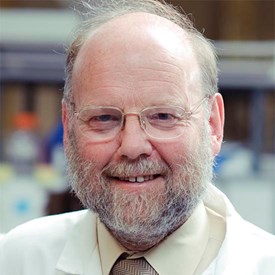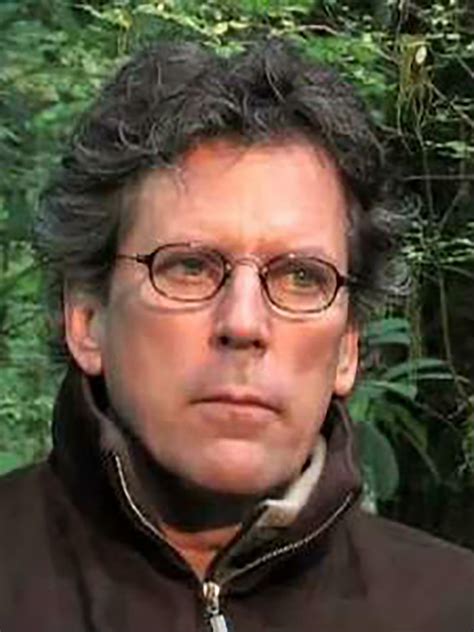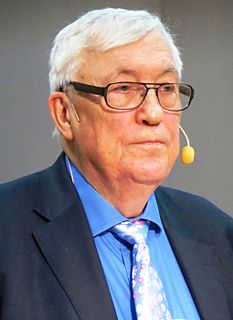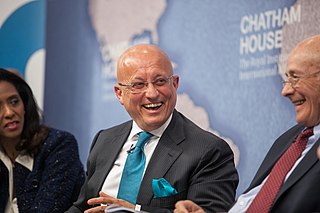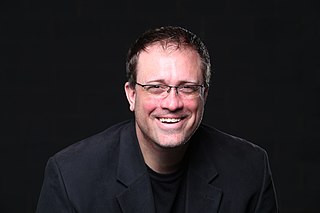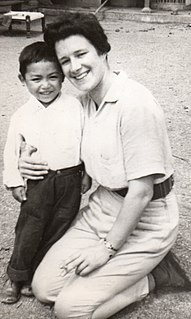Top 702 Genetic Quotes & Sayings - Page 11
Explore popular Genetic quotes.
Last updated on April 21, 2025.
Falling in love, although it resulted in altered body chemistry and was therefore real, was a hormonally induced delusional state, according to him. In addition it was humiliating, because it put you at a disadvantage, it gave the love object too much power. As for sex per se, it lacked both challenge and novelty, and was on the whole a deeply imperfect solution to the problem of intergenerational genetic transfer.
Loss of genetic diversity in agriculture is leading us to a rendezvous with extinction--to the doorstep of hunger on a scale we refuse to imagine. To simplify the environment as we have done with agriculture is to destroy the complex interrelationships that hold the natural world together. Reducing the diversity of life, we narrow our options for the future and render our own survival more precarious.
The neutral zone of selective advantage in the neighbourhood of zero is thus so narrow that changes in the environment, and in the genetic constitution of species, must cause this zone to be crossed and perhaps recrossed relatively rapidly in the course of evolutionary change, so that many possible gene substitutions may have a fluctuating history of advance and regression before the final balance of selective advantage is determined.
Why aren't crazy people content to take over, like, one town? It always has to be the whole word. They can't just control maybe twenty people. The have to control everyone. The can't just be stinking rich. The can't just do genetic experiments on a couple unlucky few. They have to put something in the water. In the air. To get everyone. I was tired of all of it.
Women's greater social desirability and beauty power afford opportunities for creating both measurable and invisible income. While the opportunities are available to almost all women and some men, they are available in abundance to the genetic celebrity ... a woman so beautiful that men do more than look and talk--they follow her.
We do share with my mother what I would refer to as an anxiety gene. And I think it is genetic, that I worry about everything. Not every day, I don't want to say it like that, but I do worry a lot about - what was the line I heard the other day, when I was saying to a girlfriend of mine that I worry? She says, "Yes, I spent my whole life worrying - and some of the things actually came true."
I do not expect that the mere fact that I was once an evangelical apologist and now see things differently should itself count as evidence that I must be right. That would be the genetic fallacy. It would be just as erroneous to think that John Rankin must be right in having embraced evangelical Christianity since he had once been an agnostic Unitarian and repudiated it for the Christian faith.
To put it another way, I believe that purpose and principle, clearly understood and articulated, and commonly shared, are the genetic code of any healthy organization. To the degree that you hold purpose and principles in common among you, you can dispense with command and control. People will know how to behave in accordance with them, and they'll do it in thousands of unimaginable, creative ways. The organization will become a vital, living set of beliefs.
I used to be pro-choice."..."I was once pro-choice and the thing that changed my mind was, I read my husband's biology books, medical books, and what I learned . . . At the moment of conception, a life starts. And this life has its own unique set of DNA, which contains a blueprint for the whole genetic makeup. The sex is determined. We know there's a life because it's growing and changing.
When nobody read, dyslexia wasn't a problem. When most people had to hunt, a minor genetic variation in your ability to focus attention was hardly a problem, and may even have been an advantage. When most people have to make it through high school, the same variation can become a genuinely life-altering disease.
The genetic stage of a gene pool can be identified by the personality characteristics of the local God. Jehovah of Genesis is a low-level barbarian macho punk God. He boastfully claims to have created the heaven and the stars and the world, but provides no technical details or replicable blueprints. His preoccupations, whims, anxieties, jealousies, rules and hatred of women are primitive mammalian brain. His petty prides are primate.
There will be no one like us when we are gone, but then there is no one like anyone else, ever. When people die, they cannot be replaced. They leave holes that cannot be filled, for it is the fate - the genetic and neural fate - of every human being to be a unique individual, to find his own path, to live his own life, to die his own death.
The worst thing that will probably happen-in fact is already well underway-is not energy depletion, economic collapse, conventional war, or the expansion of totalitarian governments. As terrible as these catastrophes would be for us, they can be repaired in a few generations. The one process now going on that will take millions of years to correct is loss of genetic and species diversity by the destruction of natural habitats. This is the folly our descendants are least likely to forgive us.
I see nothing wrong ethically with the idea of correcting single gene defects through genetic engineering. But I am concerned about any other kind of intervention, for anything else would be an experiment, which would impose our will on future generations and take unreasonable chances with their welfare ... Thus such intervention is beyond the scope of consideration.
There is no agreement on the extent to which metabolism could develop independently of a genetic material. In my opinion, there is no basis in known chemistry for the belief that long sequences of reactions can organize spontaneously -- and every reason to believe that they cannot. The problem of achieving sufficient specificity, whether in aqueous solution or on the surface of a mineral, is so severe that the chance of closing a cycle of reactions as complex as the reverse citric acid cycle, for example, is negligible.
Every batch of sperm represents an opportunity for genetic typos - called de novo mutations - to be passed on. A 20-year-old man and woman will each pass on about 20 de novo mutations to a baby they conceive. By the time the couple is 40, a woman's total has remained at 20, while a man's has jumped to 65 - and it keeps climbing from there.
We are talking about mutated women, the result of cruel genetic experiments performed by fashion designers so lacking in any sense of human decency that they think nothing of putting their initials on your eyeglass lenses. The leading cause of death among fashion models is falling through street grates. If a normal woman puts on clothing designed for these unfortunate people, she is quite naturally going to look like Revenge of the Pork Person.
There are lots of people who believe there may be at least some genetic component to procrastination, and even if there isn't, it seems to be the case that procrastination habits are often set relatively early in life (that's certainly the case with me). But I also think that there's lots of evidence that external tools can help quite a bit in getting people to stop procrastinating.
The problem [with genetic research] is, we're just starting down this path, feeling our way in the dark. We have a small lantern in the form of a gene, but the lantern doesn't penetrate more than a couple of hundred feet. We don't know whether we're going to encounter chasms, rock walls or mountain ranges along the way. We don't even know how long the path is.
Perhaps, you know, new laws, new domains of potential openness are occurring as the universe ages, and complexity previously disallowed is now possible, and we are that complexity. We are nature moving out of its genetic phase - a phase under the control of chemical genes, which are physical structures, in to an epigenetic phase, a phase of culture ruled by codes, transformable culturally confined codes - mathematics, religion, philosophy, art, dance, humor.
If every auditorium were razed to the ground, theatre would still survive, because the hunger in each of us to act and be acted to, is genetic. This intense hunger even crosses the threshold of sleep. For we direct, perform and witness performances every night - theatre cannot die before the last dream has been dreamt.
There are environmental threats to health; there are internal threats to health - genetic conditions, viral threats, diseases like cancer and Parkinson's. And then there are societal and global ones, like poverty and lack of nutrition. And unknown viral threats - everything from a new kind of influenza to hemorrhagic fever.
In the laboratory, we call this the six-degrees-of-separation-from-cancer rule: you can ask any biological question, no matter how seemingly distant-what makes the heart fail, or why worms age, or even how birds learn songs-and you will end up, in fewer than six genetic steps, connecting with a proto-oncogene or tumor suppressor.
The vast majority of abortions are performed between the seventh and tenth week when the baby is already sucking his thumb, recoiling from pricking, responding to sound. All his organs are present, the brain is functioning, the heart is pumping, the liver is making blood cells, the kidneys are cleaning fluids, and there is a fingerprint. His genetic code is uniquely and unquestionably human. And, if we are willing, he can be seen by ultrasound.
I prefer formal techniques, and use sonnets and rhyme, any manner of scheme to give a shape and order-of feeling as well as argument-to a poem. But all my life, I've also been a person who's made his bed in the morning and picks up the bath mat. That's what I mean by temperament. Whether genetic or acquired, I have a disposition to arrangements. One is born with this, as if with blue eyes or a weak heart. Do you think Allen Ginsberg ever put the cap back on his toothpaste?
Although life is a continuous process, fertilization is a critical landmark because, under ordinary circumstances, a new, genetically distinct human organism is thereby formed.... The combination of 23 chromosomes present in each pronucleus results in 46 chromosomes in the zygote. Thus the diploid number is restored and the embryonic genome is formed. The embryo now exists as a genetic unity.
We can now determine, easily and relatively cheaply, the detailed chemical architecture of genes ; and we can trace the products of these genes ( enzymes and proteins ) as they influence the course of embryology . In so doing we have made the astounding discovery that all complex animal phyla - arthropods and vertebrates in particular - have retained, despite their half-billion years of evolutionary independence, an extensive set of common genetic blueprints for building bodies.
If you defend a behavior by arguing that people are programmed directly for it, then how do you continue to defend it if your speculation is wrong, for the behavior then becomes unnatural and worthy of condemnation. Better to stick resolutely to a philosophical position on human liberty: what free adults do with each other in their own private lives is their business alone. It need not be vindicated and must not be condemned by genetic speculation.
It is much more accurate to identify the factors of production as know-how (that is genetic information structure), energy, and materials, for, as we have seen, all processes of production involve the direction of energy by some know-how structure toward the selection, transportation, and transformation of materials into the product
A lot of environmental and biological science depends on technology to progress. Partly I'm talking about massive server farms that help people crunch genetic data - or atmospheric data. But I also mean the scientific collaborations that the Internet makes possible, where scientists in India and Africa can work with people in Europe and the Americas to come up with solutions to what are, after all, global problems.
Our lack of community is intensely painful. A TV talk show is not community. A couple of hours in a church pew each Sabbath is not community. A multinational corporation is neither a human nor a community, and in the sweatshops, defiled agribusiness fields, genetic mutation labs, ecological dead zones, the inhumanity is showing. Without genuine spiritual community, life becomes a struggle so lonely and grim that even Hillary Clinton has admitted "it takes a village".
A thoroughly socialized person is one who desires only the rewards that others around him have agreed he should long for - rewards often grafted onto genetically programmed desires.A person who cannot override genetic instructions when necessary is always vulnerable..The solution is to gradually become free of societal rewards and learn how to substitute for them rewards that are under one's own powers.
Do you realize that there is nothing in our genes that tells us when to die? There are genetic codes that tell us how to grow, how to breathe, and how to sleep, but NOTHING that tells us to die. So why do we? Because we literally rust and decay our bodies from the inside out with poor food and lifestyle choices.
The genes hold culture on a leash. The leash is very long, but inevitably values will be constrained in accordance with their effects on the human gene pool. The brain is a product of evolution. Human behavior-like the deepest capacities for emotional respone which drive and guide it-is the circuitous technique by which human genetic material has been and will be kept intact.
Recently, results of the Human Genome Project have shattered one of Science's fundamental core beliefs, the concept of genetic determinism. We have been led to believe that our genes determine the character of our lives, yet new research surprisingly reveals that it is the character of our lives that controls our genes. Rather than being victims of our heredity, we are actually masters of our genome.
I think the best and perhaps only sensible policy for the future is to prepare society for change and be prepared to adjust. In 25 years, we'll have a world with some 9 to 10 billion people that will require twice as much primary energy as today. We must embrace new science and technology in a more positive way than we presently do in Europe. This includes, for example, nuclear energy and genetic food production to provide the world what it urgently needs.
The dialectical or ecological approach asserts that creating the world is involved in our every act. It is impossible for us to operate in our daily lives and not create the world that everyone must live in. What we desire arranges the genetic code in all of our major crops and livestock. We cannot avoid participating in the creation, and it is in agriculture, far and away our largest and most basic artifact, that human culture and the creation totally interpenetrate.
We want to prevent further destabilization in the world. And we want the status of being a great power: We unfortunately cannot relinquish that. In the last 300 years, this status has become a part of our genetic makeup. We want to be the heart of greater Eurasia, a region of peace and cooperation. The subcontinent of Europe will also belong to this Eurasia.
If you go out and have unprotected sex with lots of people, that behavior puts you at risk. Similarly, violent behavior can spread. One violent act can elicit a response. It can spread to people in a peer group so that they feel that they have to respond. It can pass generation to generation almost like a genetic disease.
To me writing was not a career but a necessity. And so it remains, though I am now, technically, a professional writer. The strength of this inborn desire to write has always baffled me. It is understandable that the really gifted should feel an overwhelming urge to use their gift; but a strong urge with only a slight gift seems almost a genetic mistake.
Is it all right for the government to allow the murder of an innocent human being? From the moment of conception, a new life comes into being with a complete genetic blueprint. The sex is determined. The blood type is determined. The moment that I learned the unborn was not part of the woman's body but its own individual human being, I have no choice but to defend the most vulnerable among us.
I think I look good for my age. I've always looked younger than I really am. I'm 67 and I look about, maybe 62 or something like that. And I think my healthy lifestyle has paid off. I suffer from osteoarthritis. That's genetic and there's nothing I can do about that, except to try and not jump up and down, but rather swim and bike, instead of jumping up and down.
In studying language we can discover many basic properties of this cognitive structure, its organization, and also the genetic predispositions that provide the foundation for its development. So in this respect, linguistics, first of all, tries to characterize a major feature of human cognitive organization. And second, I think it may provide a suggestive model for the study of other cognitive systems. And the collection of these systems is one aspect of human nature.
We can learn a great deal from whales. It is the same lesson we can learn from our close genetic relatives, the bonobo apes of the Congo. Here mothers have a great deal of authority, there is very little violence (with no signs of sexual violence against females), and their society is held together by sharing and caring rather than by fear and force.
It's true that to speak of an ethic of giftedness, which is very much the ethic that I deploy in raising questions about designer children and genetic engineering - an appreciation of the giftedness of the child or the giftedness of life does have religious resonance, because a great many religious traditions emphasize the sense in which the good things in life are not all our own doing; they are gifts from God.
Insect resistance to a pesticide was first reported in 1947 for the Housefly (Musca domestica) with respect to DDT. Since then resistance to one or more pesticides has been reported in at least 225 species of insects and other arthropods. The genetic variants required for resistance to the most diverse kinds of pesticides were apparently present in every one of the populations exposed to these man-made compounds.
Do you think we enjoy hearing about your brand-new million-dollar home when we can barely afford to eat Kraft Dinner sandwiches in our own grimy little shoe boxes and we're pushing thirty? A home you won in a genetic lottery, I might add, sheerly by dint of your having been born at the right time in history? You'd last about ten minutes if you were my age these days.
Medicine, electronic communications, space travel, genetic manipulation . . . these are the miracles about which we now tell our children. These are the miracles we herald as proof that science will bring us the answers. The ancient stories of immaculate conceptions, burning bushes, and parting seas are no longer relevant. God has become obsolete. Science has won the battle.
Holman's world is a worst case scenario but it's healthy to examine extreme possibilities. If the technology that is used for genetic enrichment in Genus had been distributed equitably, across society, it could have been nirvana, a great world where people don't fear the diseases that we die from. The problems that arrive are more to do with resource hording than technology itself.
By failing to read or listen to poets, society dooms itself to inferior modes of articulation, those of the politician, the salesman, or the charlatan. In other words, it forfeits its own evolutionary potential. For what distinguishes us from the rest of the animal kingdom is precisely the gift of speech. Poetry is not a form of entertainment and in a certain sense not even a form of art, but it is our anthropological, genetic goal. Our evolutionary, linguistic beacon.















